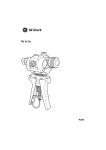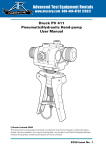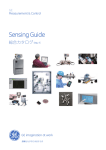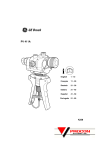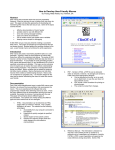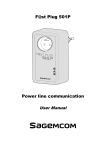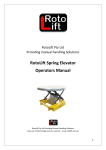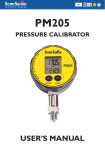Download gGE Druck - Test Equipment Depot
Transcript
99 Washington Street Melrose, MA 02176 Fax 781-665-0780 TestEquipmentDepot.com g GE Druck PV 411A English K258 Test Equipment Depot - 800.517.8431 - 99 Washington Street Melrose, MA 02176 FAX 781.665.0780 - TestEquipmentDepot.com 7 4 6 5 8+3 1 2 3 1 3 4 1 1 2 2 2 3 3 GE Druck PV 411A User Manual Introduction This manual provides operating instructions for the PV 411A Pneumatic/ Hydraulic hand-pump compatible with the requirements of line operation. The GE Druck PV 411A supersedes the Druck PV411. Safety The manufacturer has designed this equipment to be safe when operated using the procedures detailed in this manual. The user must not use this equipment for any other purpose than that stated. Only use hydraulic fluids stated in the specification. This manual contains safety and operating instructions that must be followed to make sure of safe operation and to keep the equipment in a safe condition. The safety instructions are either warnings or cautions issued to protect the user and the equipment from injury or damage. Use suitably qualified personnel and good engineering practice for all procedures in this manual. Pressure Do not apply pressure greater than the maximum safe working pressure stated in the specification. Technical advice For technical advice contact the manufacturer or subsidiary. Symbols The following symbols mark this equipment: Read the manual before use. Refer to the manual. i K258 Issue No. 3 Test Equipment Depot - 800.517.8431 - 99 Washington Street Melrose, MA 02176 FAX 781.665.0780 - TestEquipmentDepot.com GE Druck PV 411A User Manual ABBREVIATIONS The following abbreviations are used in this publication. Note: Abbreviations are the same in the singular and plural. °C BSP cm cSt °F inHg lbs ISO kg m degrees Celsius British Standard Pipe thread centimetre centi Stoke degrees Fahrenheit inches of mercury pounds International Standards Organisation kilogram metre mbar mm millibar millimetre mmH O millimetres of water NPT National Pipe Thread PRV pressure relief valve psi pounds per square inch PTFE polytetrafluoroethylene SAE Society of Automotive Engineers UUT Unit under test 2 CONTENTS Title page Introduction .................................................................................................... 1 Pneumatic pump........................................................................ 1 Hydraulic pump.......................................................................... 1 Specification ........................................................................... 1 Operation.......................................................................................................... 2 Pressure/vacuum configuration ................................................. 2 Connecting the pump ................................................................ 3 Selector valve ............................................................................ 3 Scissor-action handles limit adjuster ......................................... 3 Pneumatic Operation........................................................................................ 4 Volume adjuster ......................................................................... 4 Generating pneumatic pressure and vacuum ............................ 4 Pressure .................................................................................... 5 Vacuum...................................................................................... 5 Hydraulic Operation.......................................................................................... 6 Fluid reservoir ............................................................................ 6 Fitting ......................................................................................... 6 Filling ......................................................................................... 7 Priming the system .................................................................... 7 Vacuum priming ......................................................................... 7 Pre-filling.................................................................................... 7 Generating hydraulic pressure................................................... 8 Setting pressure relief valve....................................................... 8 Fault finding ............................................................................... 9 Annex A Returned Goods Procedure ........................................................................... 10 Approved service agents .......................................................... inside rear cover K258 Issue No. 3 ii GE Druck PV 411A User Manual Introduction The PV 411A hand-pump generates either pneumatic pressure and vacuum or hydraulic pressure. The scissor-action handles provide pneumatic pressure and vacuum generation and, in the hydraulic mode, provides hydraulic pressure generation for system priming. Pneumatic pump A selector valve (7) vents the system, to atmosphere, between selections of pressure and vacuum. Operating the scissor-action handles (5) provides the pumping stroke, for pressure generation. A volume adjuster (3) allows small adjustments of the system pressure. Hydraulic pump The selector valve (7) vents the system, to the reservoir, between selections of pressure and vacuum (used in the priming process). The volume adjuster (3) generates the required system pressure. A fluid reservoir (see Figure 2), screwed into the inlet port (1), marked RESERVOIR, on the top of the hand-pump completes the hydraulic circuit. A pressure relief valve (8) can be adjusted to set a pressure between 30 and 700 bar. Specification Pressure range Pneumatic .............................................................................0 to 60 bar Vacuum .......................................................................... 0 to -0.95 bar * Hydraulic .............................................................................0 to 700 bar Maximum safe working pressure................................................700 bar Hydraulic fluid (maximum viscosity 150 cSt at 40°C) .............................................................................. Demineralized water ................... or mineral-based oils (SAE 40W, ISO viscosity grade 150) Hydraulic fluids must be compatible with: Stainless steel, anodised aluminium, nitrile rubber, PTFE, polypropylene, delrin, acrylic and nylon. Pressure connections:....................................... ¼” BSP parallel female Weight (approximate): .................................................................. 1.2 kg Dimensions Length ....................................................................................... 260 mm Width ......................................................................................... 150 mm Depth......................................................................................... 100 mm * This value assumes atmospheric pressure at 1 bar and varies depending on atmospheric pressure. 1 K258 Issue No. 3 Test Equipment Depot - 800.517.8431 - 99 Washington Street Melrose, MA 02176 FAX 781.665.0780 - TestEquipmentDepot.com GE Druck PV 411A User Manual Connecting the Pump Connections can be made to the pump either directly or using the range of adaptors supplied in the optional test kit. Direct The ports can be fitted with any suitable length ¼ BSP male connector, sealing either with an o-ring at the bottom of the port or a bonded seal at the top. Fit a suitable blanking plug to an unused port. Swivel Adaptors (optional) The single, ¼ BSP, swivel adaptor connects with a range of fixed adaptors. Using the knurled grip-feature, hand-tighten (clockwise) the swivel adaptor, until it is fully inserted. Swivel pump head The pump head swivels through 140° providing optimum viewing angle and bench-top operation. Placing the pump on the bench allows greater force to be applied to the scissor-action handles. Internal stops prevent further rotation of the pump head. Note: Do not use excessive force when rotating the pump head. Selector Valve Pressure Turn the selector valve fully clockwise (in) position. Vacuum Turn the selector valve fully anti-clockwise (out) position. Vent Slowly turn the selector valve to the centre position. C AUTION : AVOID DAMAGING THE INSTRUMENT UNDER TEST BY USING THE VOLUME ADJUSTER TO SLOWLY RELEASE HYDRAULIC PRESSURE . Scissor-action Handles Limit Adjuster Turning the limit adjuster (4) clockwise reduces the stroke of the scissoraction handles (5), turning the limit adjuster (4) anti-clockwise increases the stroke. For maximum pneumatic pressure generation, turn the limit adjuster fully anti-clockwise. 3 K258 Issue No. 3 GE Druck PV 411A User Manual Operation WARNINGS 1 B EFORE APPLYING PRESSURE , MAKE SURE ALL CONNECTIONS ARE CORRECT AND EQUIPMENT IS INTERNALLY CLEAN AND FREE FROM DAMAGE . 2 3 4 Note: M AKE SURE THAT ALL EQUIPMENT IS TO THE CORRECT PRESSURE RATING . D O NOT EXCEED THE MAXIMUM OPERATING PRESSURE STATED IN THE SPECIFICATION . O BSERVE THE RELEVANT HEALTH AND SAFETY PRECAUTIONS . Wherever possible, use o-ring seals in the connection ports this is the recommended method of sealing. Key to 1 2 3 4 5 6 7 8 Inlet (reservoir) port Outlet port Volume adjuster Limit adjuster Scissor-action handles Outlet port Selector valve Pressure relief valve (see figure 3) Pressure/vacuum Configuration In pressure mode, air/fluid is drawn in through the inlet port (1) on the top of the pump and forced out through the two outlet ports (2 & 6). In vacuum mode, the air/fluid flow is reversed as air/fluid is drawn in through the top and rear outlet ports (2 & 6) and expelled through the inlet port (1). K258 Issue No. 3 2 Test Equipment Depot - 800.517.8431 - 99 Washington Street Melrose, MA 02176 FAX 781.665.0780 - TestEquipmentDepot.com GE Druck PV 411A User Manual Pneumatic Operation Volume Adjuster The volume adjuster can be used in different modes: Low pressure With the selector valve set to vent (open), turn the volume adjuster fully anticlockwise (out). Turn the selector valve to the fully clockwise (in) position to select pressure. Turn the volume adjuster clockwise to generate pressure. High pressure Turn the volume adjuster to the mid-position. In this position fine adjustments of the generated pressure can be made. Using the scissoraction handles, generate the approximate pressure; then turn the volume adjuster clockwise (in) to increase the pressure or turn the volume adjuster anti-clockwise (out) to decrease the pressure. Vacuum Turn the selector valve fully anti-clockwise (out) position. Turn the volume adjuster to the mid-position. In this position fine adjustments of the generated vacuum can be made. Using the scissor-action handles, generate the approximate vacuum; then turn the volume adjuster clockwise (in) to decrease the vacuum or turn the volume adjuster anti-clockwise (out) to increase the vacuum. For low vacuum use the volume adjuster only. Generating pneumatic pressure and vacuum Connect the pump as detailed on page 3. Notes 1. Compressing a gas generates heat. Gas heated or cooled in an enclosed volume causes a pressure change. It is important to allow enough time for the heated gas to cool and the pressure to stabilize. 2. The pumping required to generate a pressure depends on the volume of the system. Therefore, keep the system volume to a minimum. K258 Issue No. 3 4 GE Druck PV 411A User Manual Pressure 1 Turn the selector valve (7) fully clockwise (in) position. 2 Operate the scissor-action handles (5) to generate the approximate pressure, allow time for thermal stabilization. 3 If necessary, use the volume adjuster (3) to adjust the required pressure. 4 After attaining the required pressure operate the scissor-action handles (5) to generate a higher pressure. Alternatively, vent the pressure to atmosphere by slowly turning (anti-clockwise) the selector valve (7) to the centre position. Vacuum 1 Turn the selector valve (7) fully anti-clockwise (out) position. 2 Operate the scissor-action handles (5) to generate the approximate vacuum, allow time for thermal stabilization. 3 If necessary, use the volume adjuster (3) to adjust the required vacuum. 4 After attaining the required vacuum operate the scissor-action handles (5) to generate a higher vacuum. Alternatively, vent atmosphere into the vacuum by slowly turning (anti-clockwise) the selector valve (7) to the centre position. After completion, depressurize the pump and disconnect from the pipes and equipment. 5 K258 Issue No. 3 Test Equipment Depot - 800.517.8431 - 99 Washington Street Melrose, MA 02176 FAX 781.665.0780 - TestEquipmentDepot.com GE Druck PV 411A User Manual Hydraulic Operation WARNING OBSERVE ALL SAFETY PRECAUTIONS AND PROCEDURES STATED IN LOCAL ORDERS. C AUTIONS Note: D O NOT MIX HYDRAULIC FLUIDS . O NLY USE COMPATIBLE FLUIDS , REFER TO THE SPECIFICATION . O NLY FIT APPROPRIATE SEALS ON PRESSURE CONNECTIONS . D AMAGE CAN BE CAUSED IF EQUIPMENT CONNECTED TO THIS PUMP IS CONTAMINATED . AVOID PARTICULATE CONTAMINATION . A FTER USE , THE PUMP SHOULD BE CONSIDERED CONTAMINATED WITH HYDRAULIC FLUID . Wherever possible, use o-ring seals in the connection ports, this is the recommended method of sealing. Key to 1 2 3 4 Reservoir cover lock nut Reservoir cover O-ring Bleed hole Fluid Reservoir The main body of the reservoir is transparent acrylic providing a clear view of the contents. The reservoir can be removed from the pump without the need to empty the fluid, a self-sealing connection prevents leakage. The spring-loaded reservoir cover (2) seals under atmospheric pressure conditions, but vents excess internal pressure harmlessly in the event of inadvertent pressurization. The reservoir, connects to the inlet port on the top of the pump and supplies fluid to the pump system for pressure generation. In vacuum mode, used in priming, the fluid flow is reversed, fluid is drawn from the two outlet ports and through to the inlet port and the reservoir. Fitting Make sure that the correct o-ring seal (3) is fitted to the inlet port to prevent leakage. Screw the reservoir (clockwise) into the inlet port marked RESERVOIR. Note: Demineralized water is used to test the pump at manufacture. On shipment, there will be traces of demineralized water in the system. K258 Issue No. 3 6 GE Druck PV 411A User Manual Filling Unscrew the reservoir cover lock nut (1) and remove the reservoir cover (2). Using clean, recommended fluid fill the reservoir to approximately 2/3 full. Refit the reservoir cover and re-tighten the reservoir cover lock nut (1). Connect the required pipes and equipment to the outlet ports. Priming the system There are two methods: vacuum priming to extract the air or pre-filling the system. Notes 1. If air remains in the system, full pressure cannot be achieved as the air in the fluid compresses. Air must be removed from the system fluid. 2. Both priming methods require the pump to be held in the vertical position to keep the reservoir bleed hole (4) in fluid. Do not allow air to enter the system through this bleed hole (4). Vacuum priming Connect the equipment as detailed on page 3. Air can be removed using the vacuum facility on the pump. Note: This method should not be used with vacuum-sensitive equipment. Turn selector valve fully out, anti-clockwise (vacuum) position. Turn the volume adjuster valve fully anti-clockwise (out) position. Pump until bubbles stop appearing in the reservoir, (this generates a vacuum in the system). Turn the selector valve fully in, (this action releases the vacuum and rapidly fills the system with fluid from the reservoir). The pump and connected system is ready for use. Pre-filling Connect the equipment as detailed on page 3. Turn the selector valve fully clockwise (in) position. Loosen the reservoir cover lock nut (1) to open the reservoir cover (2) and let atmospheric pressure into the top of the reservoir. Open the bleed valve on the UUT. Carefully operate the scissor-action handles to fill the system. Stop pumping when fluid comes out of the bleed valve. Close the bleed valve on the UUT. If necessary, top-up the reservoir to the 2/3 level with clean fluid. Secure the reservoir cover by tightening the reservoir cover lock nut (1). The pump and connected system is ready for use. 7 K258 Issue No. 3 Test Equipment Depot - 800.517.8431 - 99 Washington Street Melrose, MA 02176 FAX 781.665.0780 - TestEquipmentDepot.com GE Druck PV 411A User Manual Generating Hydraulic Pressure Note: Pressurizing a fluid generates heat. A fluid heated or cooled in an enclosed volume causes a pressure change. Allow enough time to thermally stabilize. If necessary, set the PRV see following section. Open the selector valve (7) anti-clockwise 1 turn. Screw the volume adjuster (3) fully out (anti-clockwise). Close the selector valve (7). Use the scissor-action handles (5) to generate the initial pressure. Then turn the volume adjuster (3) clockwise to generate the required pressure, allow time for thermal stabilization. To reduce the pressure, turn the volume adjuster (3) out (anti-clockwise) to the required pressure. After completion, turn the volume adjuster (3) fully out (anti-clockwise) and turn the selector valve (7) to depressurize the pump. Disconnect from the pipes and equipment. Setting Pressure Relief Valve The pressure relief valve (PRV) can be set at pressures from 30 to 700 bar. C AUTION D O N OT E XCEED 700 B AR T HIS C AN D AMAGE T HE I NTERNAL S EALS O F T HE P RV AND THE PV411A. If the system pressure exceeds the set pressure, the PRV opens and vents fluid through the inlet port to the reservoir. When the system pressure decreases below the set pressure, the PRV closes. Key to 1 PRV locking screw (quantity 2) 2 PRV lock nut (with left-hand thread) 3 PRV adjusting nut (with left-hand thread) To set the PRV: 1. Connect a suitable pressure indicator to either outlet port (2) or (6). Fit a blank to the unused port. 2. Increase pressure until the relief valve operates. 3. Loosen the two PRV locking screws (1). 4. Loosen the PRV lock nut (2) by turning clockwise. 5. Set the relief pressure by turning the PRV adjusting nut (3). K258 Issue No. 3 8 GE Druck PV 411A User Manual To increase pressure Turn the PRV adjusting nut (3) anticlockwise. To decrease pressure Turn the PRV adjusting nut (3) clockwise. 6. After setting the PRV, hold the adjusting nut (3) in position and tighten the locking nut (2). Note: The locking nut has a left-hand thread. 7. Check the operation of the PRV. If necessary reset the PRV. 8. Secure the locking nut by tightening the two locking screws (1). Fault Finding If the system pressure reduces, check the following: 1. Check the selector valve (7) is in the correct position and properly tightened. 2. Allow sufficient time after pressure generation for the temperature to stabilize. The larger the system volume, the longer the time for thermal stability. 3. Check the adaptors, flexible pipe and connections between the pump and equipment under test for leaks. Tighten any loose joints and replace any seals that are worn or damaged. 4. In hydraulic mode, if the volume adjuster can be wound fully in, but maximum pressure cannot be achieved, there is probably air trapped in the system. Re-prime, and repeat. 5. Check PRV pressure setting. If, for any reason, a fault occurs within the pump, it is recommended that the equipment be returned to an appointed agent. 9 K258 Issue No. 3 Test Equipment Depot - 800.517.8431 - 99 Washington Street Melrose, MA 02176 FAX 781.665.0780 - TestEquipmentDepot.com GE Druck PV 411A User Manual Annex A Returned goods procedure Should the unit become unserviceable and require repair it can be returned to the GE Druck Service Department. Please contact our Service Department, either by ‘phone or fax, to obtain a Returned Goods Authorization (RGA) number, providing the following information: Product (i.e. PV 411A) Pressure medium (i.e. pneumatic, hydraulic) Serial number Details of defect/work to be undertaken Operating conditions Safety Precautions You must also tell us if the product has been in contact with anything hazardous or toxic and the relevant COSHH references and precautions to be taken when handling. Important notice Service by unauthorized sources will affect the warranty and may not guarantee further performance. K258 Issue No. 3 10














